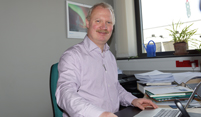Specialisations
Students must achieve 20 ECTS within a field of specialisation (10 ECTS per semester).
- 15 ECTS must be achieved from a chosen specialisation
- 5 ECTS can be achieved from modules of another specialisation or other lectures
- each lecture can only be credited to one module and each module can only be credited to one specialisation.
Medical Physics
Medical Physics | Radiation protection aspects and dosimetry play a predominant role in the use of ionising radiation in medical diagnostics and therapy. A large number of medical imaging methods are based on nuclear effects, e.g. SPECT, PET and MRI, and a growing number of patients receive cancer treatment through various types of radiotherapy. Legal requirements dictate that experts in Medical Physics perform radiation and dosimetric control of these diagnostic and therapeutic procedures. In combination with basic knowledge of medical physics, medical imaging devices and anatomy normally covered by a Bachelor's degree in Biomedical Engineering, our students obtain the basic knowledge of a Medical Physics Expert certificate, which must be supplemented by a two-year practice period in a radiation therapy laboratory.
Nuclear Chemistry
A key discipline in many applications of Nuclear Technologies is Nuclear Chemistry. Whenever radioactive materials need to be handled and transformed, nuclear chemists are involved. They can be found at all stages of the nuclear fuel cycle: Separation and enrichment of uranium as well as fuel production. In nuclear power plants, they control chemical aspects of the cooling cycles, fuel integrity and effluents. They play an important part in the treatment of all forms of waste and their storage, as well as in the dismantling of nuclear facilities. In radioecology, they detect and quantify natural and artificial radionuclides in the environment using radioanalytical methods. For radiotracer applications, they develop radionuclides and radioactively labelled compounds. A special field is the development and production of radiopharmaceuticals for medical diagnostics and therapy.
Nuclear Technology
Various modern technologies are based on the use of nuclear methods. This focus area concentrates on these techniques and covers a wide range of typical applications. This includes, for example, detector development and characterisation for industrial and fundamental research for various applications. Special knowledge of the interaction of radiation with materials is required here. Radiation protection is also part of this, for which specialists are always needed, as protection against the dangers of nuclear radiation is extremely important. The development and use of various accelerator systems, again in industry and research, is also a typical task in the field of nuclear technology. A modern matter of concern for humanity is the growing demand for energy. Here, research into the further development of next-generation nuclear reactor concepts, including safety and waste management aspects, urgently needs to be conducted by experts in nuclear technologies. Similarly, the dismantling of nuclear facilities and the disposal of nuclear waste is a rapidly evolving task that requires highly skilled professionals.
Nuclear Waste Management
This focus area has only recently been added to the degree programme because of the increasing demand for graduates who are familiar with all aspects of nuclear waste management. This includes not only the planning and operation of interim and final storage facilities. Students are also familiarised with the safety aspects and processes of waste management technology as well as international and national legislation relating to the transport, storage and disposal of radioactive waste. This focus area is carried out in close cooperation with BGZ - Gesellschaft für Zwischenlagerung mbH (BGZ Company for Interim Storage). This way, a demand-oriented and practical training is to be ensured, among other things. In addition to the courses offered at Campus Jülich, work placements, projects, excursions and similar formats can also be made available at the BGZ sites.

